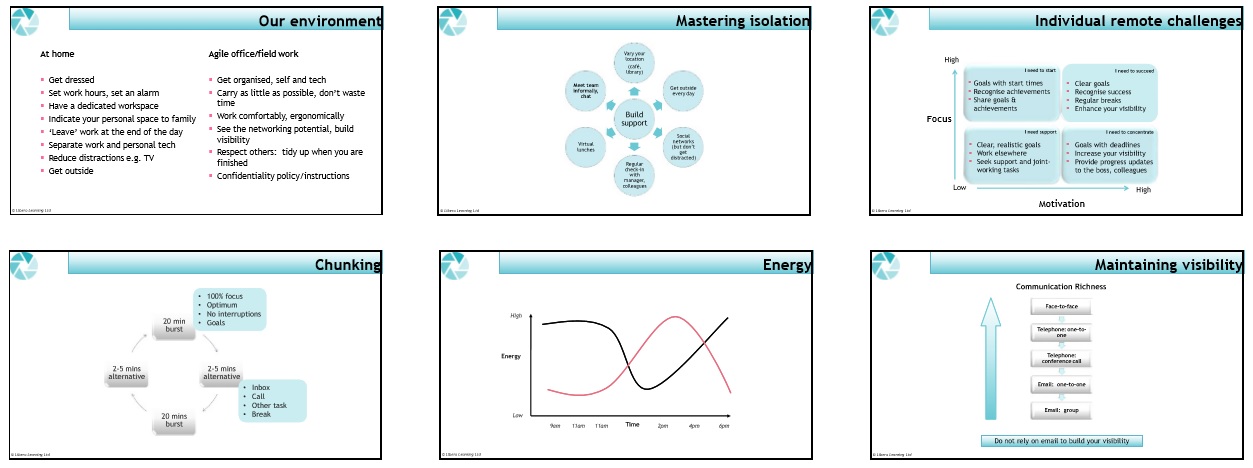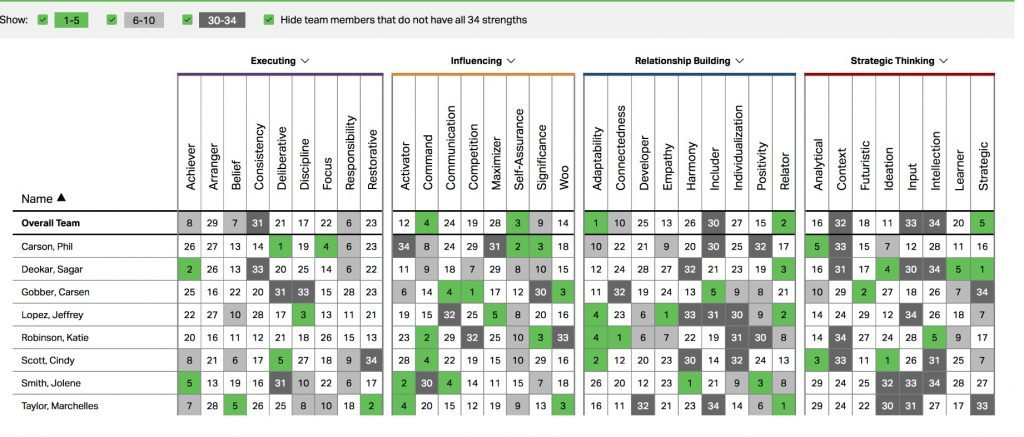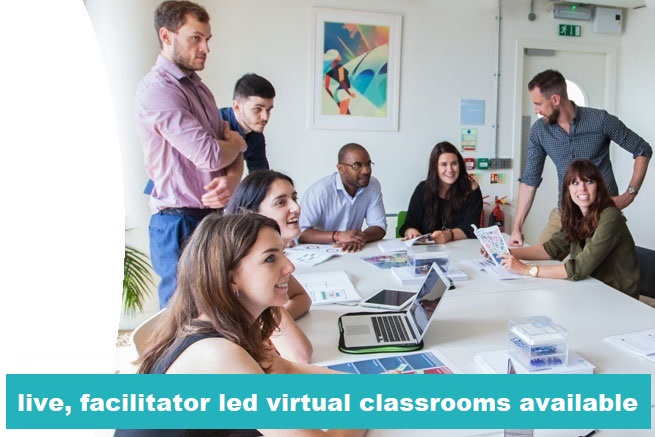Bespoke leadership training
Modular programmes tailored to your learners' needs
- Research-backed content
- Experienced and engaging trainers
- Flexible duration and topics
- Virtual or classroom delivery

20
year track record
1,200+
organisations supported
30,000+
learners trained

We create and deliver leadership training designed around your priorities.
We'll work with you to identify the knowledge and tools that will have the biggest impact in your learners' roles, and design a training programme around them.
Content can be drawn from our huge existing library or created just for you.
From masterclasses on a single topic to comprehensive leadership programmes, our highly experienced trainers can deliver your course in-person, online, or as a mixture of both.
to meet our needs from start to finish."

Example content
Below is a sample of some of our more popular modules. Just click on the titles for more information.
- Identifying our current challenges
- Adaptability and the role of today’s leader / manager
- Using action-centred leadership to manage the task, build the team and support the individual
- Maintaining communication, collaboration, information parity and relationships across on-site, hybrid and remote teams
- Ensuring inclusion
Using short-term goals to motivate your team and monitor productivity - Building competence and confidence across your team
- Developing a flexible leadership style
- Delegating to develop rather than dumping through despair
- Skills to develop team members’ ability to make better decisions and use their initiative
- Understanding the business benefits of increasing employee engagement
- 12 practical ways to boost engagement and retention in your team
- Understanding the value of psychological safety and how to build it
- Ensuring trust, inclusion and a sense of belonging across the team
- Understanding the links between emotional intelligence, effective leadership and organisational performance
- Managing by outcomes
- Holding effective 1:1s that are ‘check-ins’ rather than ‘checking-up’
- Providing effective and performance-boosting feedback
- Increasing ownership and accountability across the team
- Addressing digital exclusion and ensuring a level playing field for all team members, wherever they are based
- Ensuring clear purpose, structure, and roles during meetings
- Using meetings to drive things forward
- Achieving engagement and holding productive discussions during meetings (in-person, hybrid or virtual)
- Collaborating, disagreeing and brainstorming during meetings – tools and techniques
- Building relationships with other teams across the organisation
- Identifying problems by listening to what’s not being said
- Understanding the value and sources of social capital
- Maximising your social capital inside and outside of your organisation
- Understanding and noticing wellbeing challenges
- Spotting warning signs of poor wellbeing / mental health in individual team members
- Feeling confident raising concerns with an employee about their wellbeing or mental health
- Building adaptability and agility across the team
- Coping with uncertainty
- Techniques to support emotional wellbeing and mental health in yourself and your team
- Managing thought patterns, perception and beliefs positively
- Helping your team’s sense of perspective and pragmatism
- Understanding the importance of control to wellbeing, and discovering ways to support your team’s sense of control at work and beyond
- Building effective, supportive team relationships
- The business case for Emotional intelligence – the link between EI and profit
- The difference between our intention and our behaviour
- Balancing your brain’s internal advisors: Emotional, rational, intuitive and instinctive
- How to handle feelings like anger, pessimism and envy
- Being a ‘mood hoover’ or a ‘radiator’
- Reading the emotional landscape
- Expressing authentic thoughts and feelings
- Developing political savvy
- Dealing with difficult people and situations
- Managing conflict in a positive way across a team
- Choosing the most appropriate way of communicating
- The difference between efficient and effective communication
- Harnessing the power of great questions to enable the team to make independent decisions
- Using the GROW model to coach and develop your team
- Empowering the team to build their problem-solving capacity
- Building competence and confidence across the team
- An extended skills practice session using the GROW model
- Identifying the key types of challenging conversation
- Setting expectations and providing evidence
- Managing tricky attitudes and behaviours
- Identifying what presses your buttons during challenging conversations and how it shows
- Understanding the amygdala hijack and why it is harder to think clearly under pressure
- Tips to manage your communication under pressure
- Preparing for your own difficult conversation
- Using the change curve and other change models to understand the process of change
- Identifying what is required of a leader during change
- Understanding different people’s responses to change
- Supporting your team and employees going through change
- Avoiding common pitfalls
- Taking your team with you
- Applying a range of change management models to your own change situation
- What do we mean by strategy
- Understanding the strategic management process
- Using PESTLE and SWOT to identify areas where change may be required
- Planning where you / your team would like to be in a defined period
- Involving your team in setting strategy
- Setting strategic goals, tactics and objectives to achieve your strategy
- Understanding the difference between constructive and destructive disagreement
- The important role of positive disagreement in coming to better decisions at work
- Using cognitive diversity to improve decision making and performance
- Using skills to disagree with individuals
- Using a proven tool to disagree productively in teams to make better decisions
- Identifying and improving on your natural disagreement style
- Identifying and accounting for others’ personalities when disagreeing with them
- Identifying ways of shaping a culture of positive disagreement in your team
The modules outlined above really are just the tip of the iceberg. We have a huge library of high quality content for you to draw on, and can adapt every session to meet your organisational context and learners' needs.
We'd love to talk to you about your requirements in more detail. Please get in touch to arrange a call.Kate Jennings, Lead Consultant

Additional tools
Beyond the training itself, learning can be supported through an online portal containing curated videos, articles, book suggestions and recaps that help to cement and build on the course content.
We also offer up to six months individual email coaching to support those who need help applying their new skills after the programme. Follow-up training can also be organised to maintain momentum.


You might choose to incorporate psychometric, strengths of personality assessments into your programme.
Our trainers are qualified in a wide range of tools that can be used to help learners to understand their personal strengths and development needs, build self-knowledge, and understand how they are perceived by others.
Examples of three popular tools can be found below.

StrengthsFinder
A sophisticated tool that reveals the strengths, preferences and characteristics of each learner, helping them to identify the ways they can best contribute to team success. Ideal for developing self- and team-awareness, and for informing the creation of collaboration processes that make the most of the team's intellectual and emotional resources.

EI360
This measure of emotional intelligence is based on feedback from a wide range of colleagues, and can be used to increase self-understanding and improve interactions with colleagues. This can be especially for managers of teams where relationships are in need of improvement.

Influencing styles
This quick, simple assessment helps participants to understand their preferred mode of persuasion. Understanding and adapting to the influencing styles of colleagues is an important step to maximising the impact of your communication at work.
Classroom or virtual delivery
Our leadership training programmes can be delivered in the classroom or virtually. In either case, the sessions are delivered by highly experienced tutors, and involve plenty of interaction, discussion and practical exercises.
Classroom courses last a full day to allow time for practical elements and discussion. Virtual programmes are usually split into two or more modules, each focused on a particular topic and around two-hours in length.

Why choose Cambridge Exec?
If you’re looking for inspiring leadership training backed by the best research and analytical tools, you’ve come to the right place.

friendly and created a brilliant
energy level in the room."

Flexible approach with workshops tailored to your needs
With content chosen from our unique library of modules and further adapted to your needs, you can be sure your training will have maximum impact and no filler.
Robust diagnostics and expert analysis
Our team are qualified experts in a range of industry-leading psychometrics, strengths assessments and team diagnostics that build self-knowledge and provide unparalleled insights into the workings of their teams.
Engaging, motivating and fun facilitation
Our facilitators are all highly experienced classroom and virtual trainers. They are experts at ensuring full engagement and keeping participants fresh and energised.
Immediate impact through action plans
We build in time for creating practical action plans helps to ensure lessons learnt are applied to real life straight away.
Follow-up support and coaching
For those who want extra help implementing their learning, optional post-workshop sessions and coaching are available for individuals and teams.

Just provide a couple of details and we'll send you further information, including:
- Prices
- Delivery formats
- Availability/timelines
- How to book a call to discuss your needs

